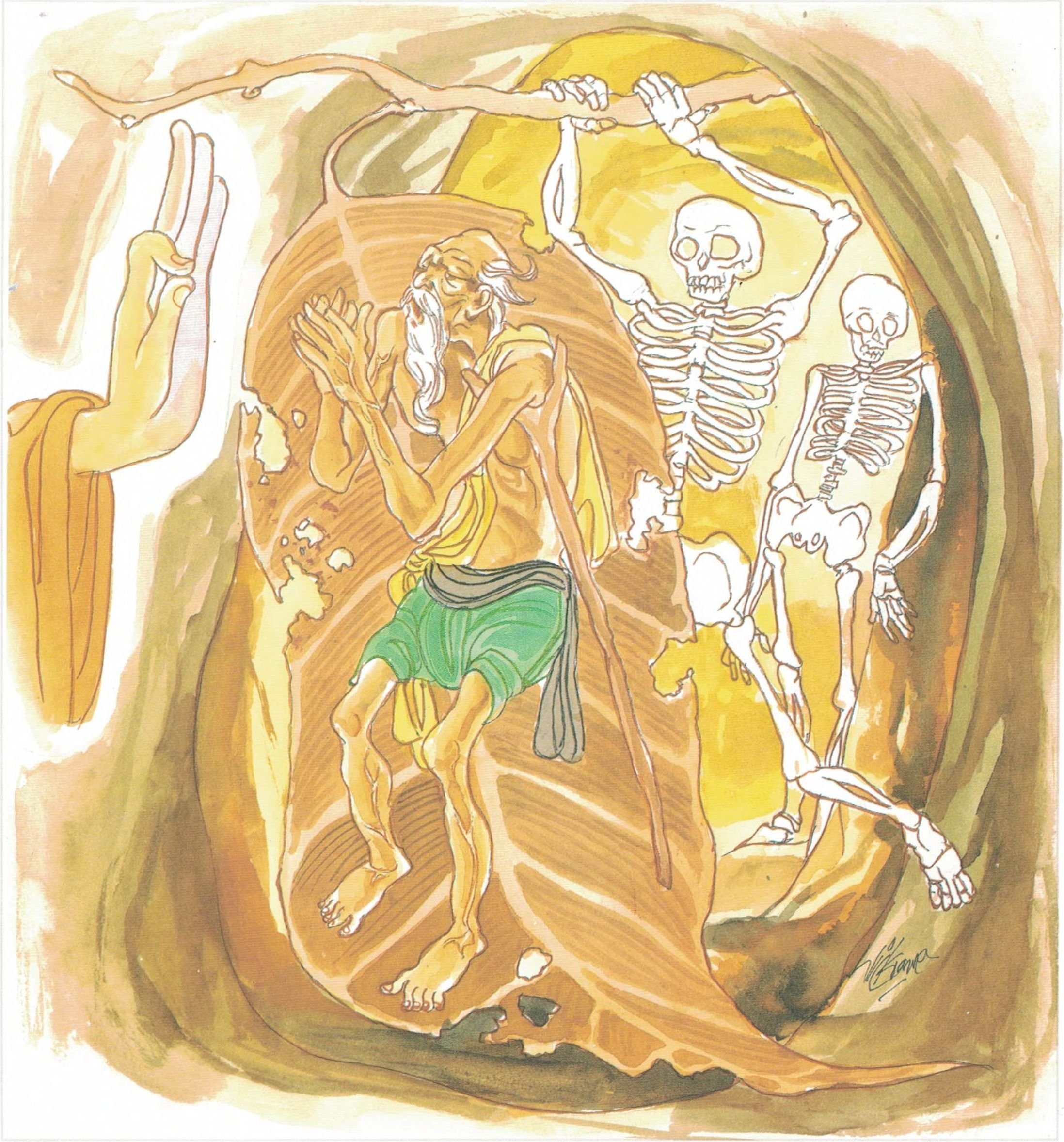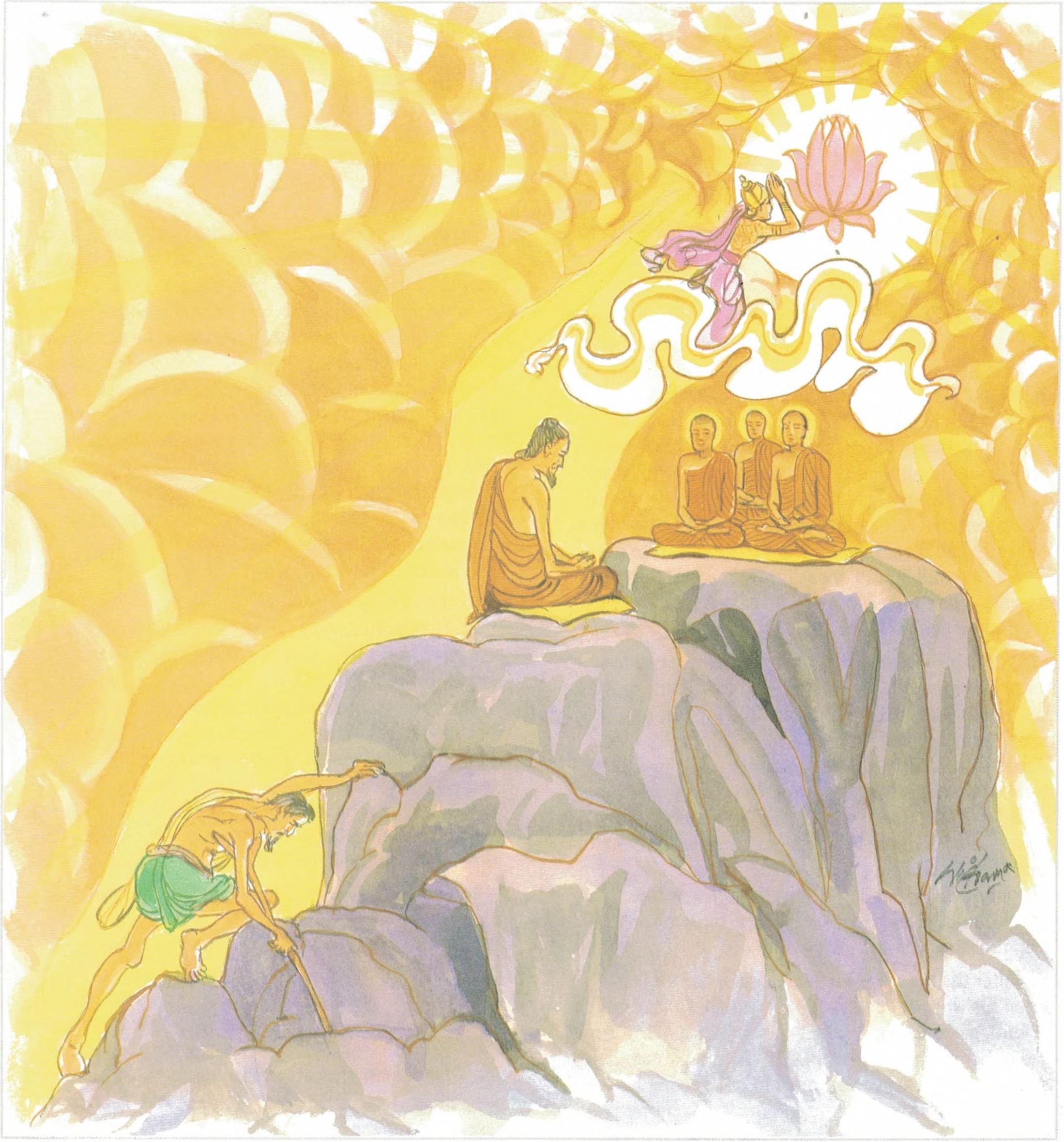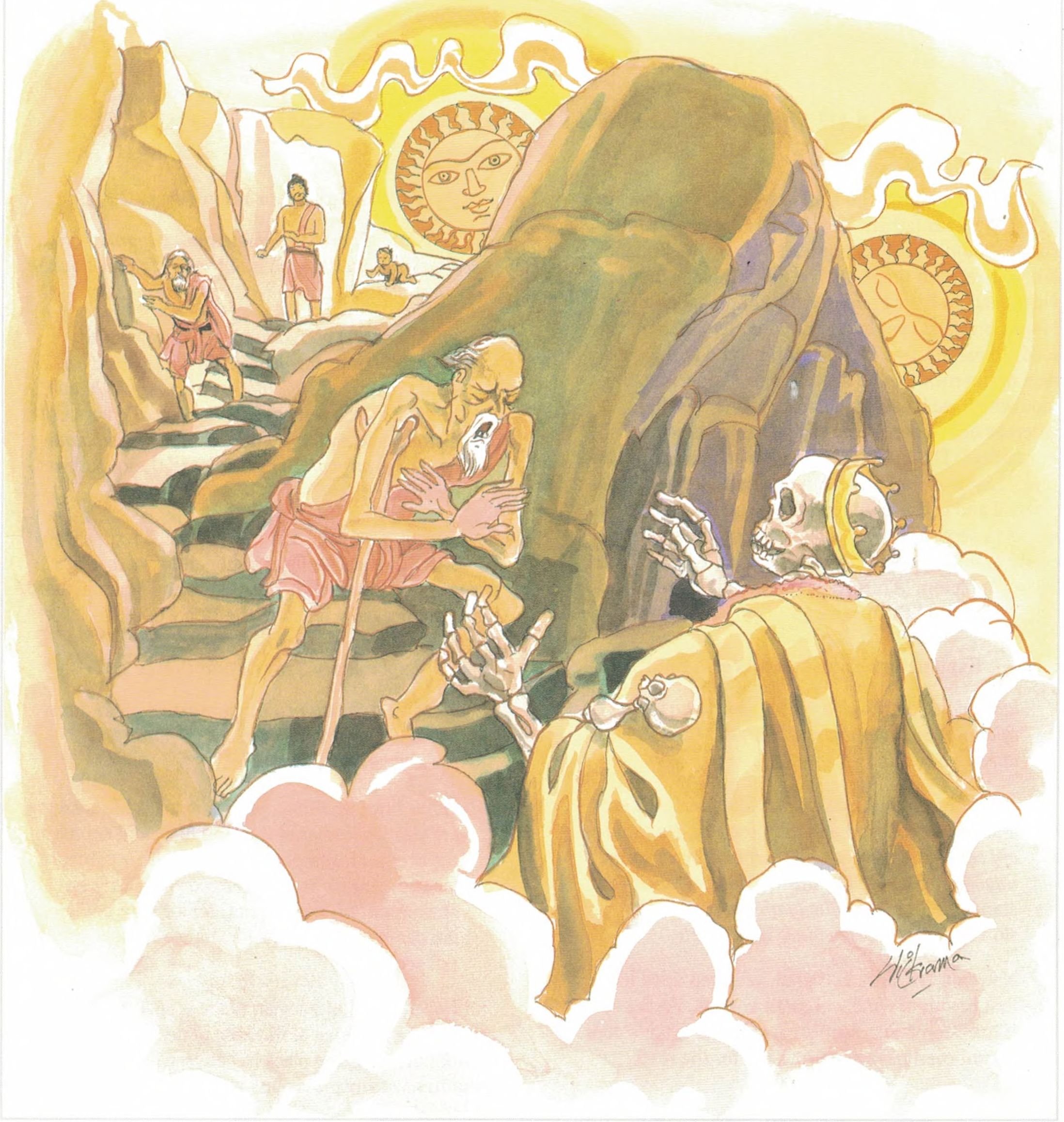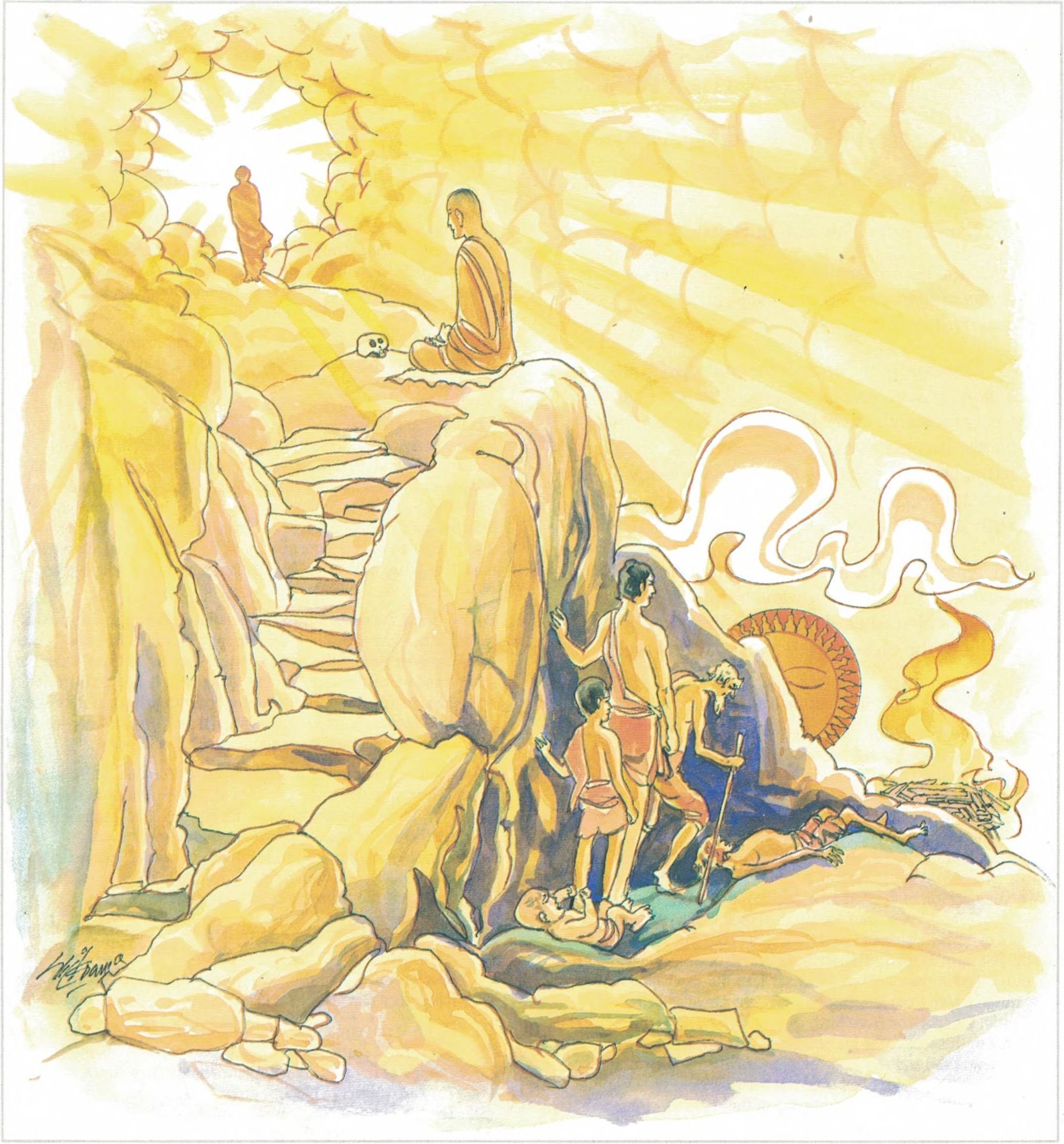Dhammapada (Illustrated)
by Ven. Weagoda Sarada Maha Thero | 1993 | 341,201 words | ISBN-10: 9810049382 | ISBN-13: 9789810049386
This page describes The Story of the Son of a Butcher which is verse 235-238 of the English translation of the Dhammapada which forms a part of the Sutta Pitaka of the Buddhist canon of literature. Presenting the fundamental basics of the Buddhist way of life, the Dhammapada is a collection of 423 stanzas. This verse 235-238 is part of the Mala Vagga (Impurities) and the moral of the story is “Unprepared for death, thou art, like a withering leaf. Empty-handed, to depart” (first part only).
Verse 235-238 - The Story of the Son of a Butcher
Pali text, illustration and English translation of Dhammapada verse 235-238:
paṇḍupalāso'va'dāni'si yamapurisā'pi ca taṃ upaṭṭhitā |
uyyogamukhe ca tiṭṭhasi patheyyam'pi ca te na vijjati || 235 ||
so karohi dīpamattano khippa vāyama paṇḍito bhava |
niddhantamalo anaṅgaṇo dibbaṃ ariyabhūmiṃ ehisi || 236 ||
upanītavayo'ca'dāni'si sampayāto'si yamassa santike |
vāso'pi cate tthi antarā pātheyyam'pi ca te na vijjati || 237 ||
so karohi dīpamattano khippa vāyama paṇḍito bhava |
niddhantamalo anaṅgaṇo na puna jātijaraṃ upehisi || 238 ||
235. Now a withered leaf you are and now Death’s men draw near, now you stand at the parting gates but waybread you have none.
236. Make an island of yourself, quickly strive and wise become, freed from stain and passionless to go to the pure Abodes.
237. Even now the end draws near, to the presence of death you’ve fared, along the path’s no place for rest and waybread you have none.
238. Make an island of yourself, quickly strive and wise become, freed from stain and passionless you’ll not return, take flesh, decay.
 Unprepared for death, thou art, like a withering leaf. Empty-handed, to depart. |
 Be wise and strive in earnest. An island for yourself, make. To the āriyan place you shall go. |
 At life’s end, at death’s door you strive. With nothing for the way and no stop in between. |
 Quick and wise, an island to yourself make. Stainless, free from death and decay. |
The Story of the Son of a Butcher
While residing at Jetavana Monastery, the Buddha spoke these verses, with reference to the son of a butcher.
At Sāvatthi, so we are told, lived a certain butcher. He would kill cows, select the choicest portions of their flesh for his own table, cause the same to be cooked, and then sit down with son and wife and eat the same; the rest he sold for a price. For fiftyfive years he kept up this practice of killing cows. During all this time, although the Buddha resided at a neighbouring monastery, on no occasion did he give the Buddha so much as a spoonful of rice-gruel or boiled rice by way of alms. If he had meat to eat, he never ate rice. One day while it was still light, after selling some beef, he gave his wife a piece of beef to cook for his supper, and then went to the pool to bathe.
While he was absent, a friend of his came to the house and said to his wife, “Let me have a little of the beef which your husband has for sale; a guest has come to my house.” “We have no beef for sale. Your friend has sold all his beef and has gone to the pool to bathe.” “Do not refuse my request; if you have a piece of beef in the house, give it to me.” “There is not a piece of beef in the house, except a piece which your friend has set aside for his own supper, and as he will not eat unless he can have meat to eat, he will certainly not give you this piece of beef.” But he took the piece of beef and went off with it.
After the butcher had bathed, he returned home. When his wife set before him rice which she had boiled for him, seasoned with leaves of her own cooking, he said to her, “Where is the meat?” “Husband, there is none.” “Did I not give you meat to cook before I left the house?” “A friend of yours came to the house and said to me, ‘A guest has come to my house; let me have a little of the beef which you have for sale.’ I said to him, ‘There is not a piece of beef in the house, except a piece which your friend has set aside for his own supper, and he will not eat unless he can have meat to eat.’ But in spite of what I said to him, he took the piece of beef himself and went off with it.” “Unless I have meat to eat with it, I will not eat rice; take it away.” “What is to be done, husband? Pray eat the rice.” “That I will not.” Having caused his wife to remove the rice, he took a knife in his hand and left the house.
Now an ox was tethered in the rear of his house. The man went up to the ox, thrust his hand into the mouth of the ox, jerked out his tongue, cut it off at the root with his knife, and returned to the house with it. Having had it cooked on a bed of coals, he placed it on the boiled rice and sat down to eat his supper. He first ate a mouthful of rice, and then placed a piece of meat in his mouth. That very moment his own tongue was cleft in twain and fell out of his mouth into the dish of rice. That very moment he received retribution similar in kind to the sin which he had committed. With a stream of blood flowing from his mouth, he entered the court of his house and crawled about on his hands and knees, bellowing just like an ox.
At this time his son stood close by, watching his father. His mother said to him, “Son, behold this butcher crawling about the court of the house on his hands and knees, bellowing like an ox. This punishment is likely to fall upon your own head. Pay no attention to me, but seek safety in flight.” The son, terrified by the fear of death, bade farewell to his mother and fled. Having made good his escape, he went to Takkasilā. As for the cow-killer, after he had crawled about the court of the house for a time, bellowing like an ox, he died, and was reborn in the Avīci Hell. The ox also died.
Having gone to Takkasilā, the butcher’s son became apprenticed to a goldsmith. One day his master, as he set out for the village, said to him, “You are to make such and such an ornament.” So saying, his master departed. The apprentice made the ornament according to the directions he received. When his master returned and looked at the ornament, he thought to himself, “No matter where this youth may go, he will be able to earn his living anywhere.” So when the apprentice came of age, the goldsmith gave him his daughter in marriage. He increased with sons and daughters. When his sons came of age, they acquired the various arts and subsequently going to Sāvatthi to live, established households of their own, and became faithful followers of the Buddha. Their father remained in Takkasilā, spent his days without performing a single work of merit, and finally reached old age. His sons thought to themselves, “Our father is now an old man,” and sent for him to come and live with them.
Then they thought to themselves, “Let us give alms on behalf of our father.” Accordingly they invited the congregation of monks presided over by the Buddha to take a meal with them. On the following day they provided seats in their house for the congregation of Monks presided over by the Buddha, served them with food, showing them every attention, and at the conclusion of the meal said to the Buddha, “Venerable, this food which we have presented to you is the food whereby our father lives; render thanks therefore to our father.” The Buddha thereupon addressed him and said, “Lay disciple, you are an old man. Your body has ripened and is like a withered leaf. You have no good works to serve as provisions for the journey to the world beyond. Make for yourself a refuge. Be wise; be not a simpleton.” Thus spoke the Buddha, pronouncing the words of thanksgiving.
Explanatory Translation (Verse 235)
idāni paṇḍupalāso iva asi taṃ yamapurisā api ca upaṭṭhitā
uyyogamukhe ca tiṭṭhasi te pātheyyaṃ api. ca na vijjati
idāni: now; paṇḍupalāso iva: like a leaf withered and yellow; asi: you are; taṃ: for you; yamapurisā api ca: death’s forces too; upaṭṭhitā: have come; uyyogamukhe ca: (at) death’s door; tiṭṭhasi: you stand; te: for you; pātheyyaṃ api ca: even provision for the road; na vijjati: is not seen
Now you are like a withered, yellowed dried leaf. The first breath of wind will make you fall. Forces of Death have come for you. You are now at death’s door. You do not even have any provision for the road.
Explanatory Translation (Verse 236)
so attano dīpaṃ karohi khippaṃ vāyama paṇḍito bhava
niddhantamalo anaṅgaṇo dibbaṃ ariyabhūmiṃ ehisi
so: (therefore) you; attano [attana]: to your own self; dīpaṃ [dīpa]: a lamp; karohi: become; khippaṃ [khippa]: earnestly (quickly); vāyama: strive; paṇḍito bhava: become a wise person; niddhantamalo [niddhantamala]: bereft of blemishes; anaṅgaṇo [anaṅgaṇa]: devoid of pains; dibbaṃ [dibba]: heavenly; ariyabhūmiṃ [ariyabhūmi]: realm of the noble ones; ehisi: reach
As things are, be a lamp, an island, a refuge unto yourself. Strive earnestly and diligently and become a wise person. Bereft of blemishes, devoid of defilements, reach the heavenly realm of the Noble ones.
Explanatory Translation (Verse 237)
idāni upanītavayo ca asi yamassa santike sampayāto asi
te antarā vāso api ca natthi te pātheyyaṃ api ca na vijjati
idāni: now; upanītavayo ca: of spent life span; asi: are you; yamassa: of the king of Death; santike: the presence; sampayāto asi: you have come; te: for you; antarā: in between; vāso api ca: even a shelter; natthi: there is not; te: for you; pātheyyaṃ api ca: even provisions for the road; na vijjati: are not seen
Now, your allotted span of life is spent. You have reached the presence of the king of death (Yama). You do not have a resting place in between. You do not seem to have any provisions for the road either.
Explanatory Translation (Verse 238)
so attano dipaṃ karohi khippaṃ vāyama paṇḍito bhava
niddhantamalo anaṅgaṇo puna jātiṃ jaraṃ na upehisi.
so: (therefore) you; attano [attana]: for your own self; dipaṃ [dipa]: a lamp; karohi: become; khippaṃ [khippa]: earnestly (quickly); vāyama: make an effort; paṇḍito bhava: become a wise person; niddhantamalo [niddhantamala]: bereft of blemishes; anaṅgaṇo [anaṅgaṇa]: devoid of defilements; puna: once again; jātiṃ jaraṃ [jara]: the cycle of birth and decay; na upehisi: do not enter
Therefore, become a lamp, an island, a refuge to your own self. Strive earnestly and become a wise person. Bereft of blemishes, devoid of defilements, you will not enter the cycle of birth and decay any more.
Commentary and exegetical material (Verse 235-238)
upanītavayo: of spent life span. These stanzas have the death theme as their central focus. The need to be aware that life will end is embodied in these stanzas. The Buddha admonishes the aged person to be aware of the possibility of death and accommodate provision to end suffering. This, in effect, is an effort to make him alert and mindful to the ever present threat of death. In the Buddhist system of meditation, the awareness of death, and being mindful of it, form a crucial field of meditation. A practical guide to this meditative contemplation of death is an essential for all. This form of meditation is maraṇānussati bhāvanā–meditation on being mindful of death. Maraṇānussati means the constant reflection on death. The form of meditation that one practises while reflecting on death is called maraṇānussati bhāvanā. Like the sun which moves on without a stop from sunrise to sunset, the life of all beings of this world, too, goes on from birth to death. There is no one who is immortal in this world. The life of a being is as impermanent as a drop of dew at the end of a blade of grass at dawn. It is as evanescent as a line drawn on water or a bubble on the surface of water. Life comes to an end with death during any of the states–childhood, youth or old age.
Death is a legacy that all beings, be they humans, animals, deities or brahmas, have acquired. It is the very nature of this world that whatever comes into existence should someday cease to be. This impermanence, characterized by coming into being and cessation, is common to all animate and inanimate objects of the world.
We should bear in mind the fact that trees, mountains, rivers, cities, oceans, the sun and the moon, machinery and other equipment–all these are subject to change and decay. All beings of the world have to confront a three-fold fear someday or other, namely, old age (jarā), disease (vyādhi) and death (maraṇa). It is not possible to ward off these fears by such factors as wealth, position, power or learning. Therefore, we cannot consider life as something satisfactory or comfortable.
A person who does not think of death cannot grasp the impermanent nature of life. The mind of such a person is susceptible to evil and dangerous thoughts such as enmity, revenge, avarice, selfishness and excessive pride. The practice of maraṇānussati bhāvanā is of immense help to ward off the above-mentioned evil thoughts and to cultivate such virtues as kindness, sympathetic joy, honesty, equality, nonviolence and generosity.
The Buddha has shown us that there are three divine messengers in society who teach us three important lessons. They are the old, the diseased and the dead. We meet these messengers frequently. When you see someone who is disabled through old age, reflect on the fact that you yourself will be subject to such a state someday; when you see a sick person, think of the possibility of being diseased yourself, when you attend a funeral or when you see a dead body or hear of a death, reflect on the fact that you too will die someday. By doing so you will necessarily begin to honour elders, help the poor and the afflicted and lead a virtuous life. Furthermore, it will help you to lead a life of comfort and solace by giving up the pride that arises out of wealth, position, power clan, learning and youth.
By practicing the maraṇānussati bhāvanā daily you could gradually get rid of the fear of death. Furthermore, you will not be struck with excessive grief even at the death of your parents, brothers, sisters or other loved ones. This fact becomes clear from the ancient stories of Mallikā, Patācārā and Kisāgotamī or from the Jātaka stories like the Uraga Jātaka. Therefore, always consider the great benefits you would gain by the practice of maraṇānussati meditation.
Before you commence the practice of maraṇānussati bhāvanā, you should clean yourself, make offerings of flowers, etc., and seek refuge in the Triple Gem and observe the fivefold precepts, as mentioned earlier in the case of the other types of meditation. Thereafter, be seated in a suitable posture in a place conducive to meditation. Now, you should commence the practice of meditation by reflecting on the following facts again and again.
(1) I am subject to old age, disease and death. Like me, all beings of the world are subject to old age disease and death.
Now you can go into the second stage, by reflecting on the following, again and again, from beginning to end:
(2) My life is impermanent. Death is certain. I am subject to old age, disease and death.
(3) The life of my parents is impermanent. Their death is certain. They are subject to old age, disease and death.
(4) The life of my teachers is impermanent. Their death is certain. They are subject to old age, disease and death.
(5) The life of my brothers and sisters is impermanent. Their death is certain. They are subject to old age, disease and death.
(6) The life of my relatives is impermanent. Their death is certain. They are subject to old age, disease and death.
(7) The life of my dear ones is impermanent. Their death is certain. They are subject to old age, disease and death.
(8) The life of my neighbours is impermanent. Their death is certain. They are subject to old age, disease and death.
(9) The life of those who are ill-disposed towards me is impermanent. Their death is certain. They are subject to old age, disease and death.
(10)The life of all beings in this world is impermanent. Their death is certain. They are subject to old age, disease and death.
When you practice this meditation for a long period, your body, words and mind will become pure. You will not be the cause of any harm to society. Your actions, words and thoughts will be for the benefit of all.
The life of a person who practises this meditation constantly will indeed be a happy one and he will be able to face death without any fear whatsoever. Furthermore, it will help him to obtain the comforts of gods and men in the next world and to attain Nibbāna in the end.
To the average man, death is by no means a pleasant subject for talk or discussion. It is something dismal and oppressive–a veritable kill-joy, a fit topic for a funeral house only. The average man, immersed as he is in the self, ever seeking after the pleasurable, ever pursuing that which excites and gratifies the senses, refuses to pause and ponder seriously that these very objects of pleasure and gratification will some day reach their end. If wise counsel does not prevail and urge the unthinking, pleasure-seeking man, to consider seriously that death can knock at his door also, it is only the shock of a bereavement under his own roof, the sudden and untimely death of a parent, wife or child that will rouse him up from his delirious round of sense-gratification and rudely awaken him to the hard facts of life. Then only will his eyes open, then only will he begin to ask himself why there is such a phenomenon as death. Why is it inevitable? Why are there these painful partings which rob life of its joys?
To most of us, at some moment or another, the spectacle of death must have given rise to the deepest of thoughts and profoundest of questions. What is life worth, if able bodies that once performed great deeds now lie flat and cold, senseless and lifeless? What is life worth, if eyes that once sparkled with joy, eyes that once beamed with love are now closed forever, bereft of movement, bereft of life? Thoughts such as these are not to be repressed. It is just these inquiring thoughts, if wisely pursued, that will ultimately unfold the potentialities inherent in the human mind to receive the highest truth.
According to the Buddhist way of thinking, death, far from being a subject to be shunned and avoided, is the key that unlocks the seeming mystery of life. It is by understanding death that we understand life; for death is part of the process of life in the larger sense. In another sense, life and death are two ends of the same process, and if you understand one end of the process, you also understand the other end. Hence by understanding the purpose of death, we also understand the purpose of life. It is the contemplation of death, the intensive thought that it will someday come upon us, that softens the hardest of hearts, binds one to another with cords of love and compassion, and destroys the barriers of caste, creed and race among the peoples of this earth, all of whom are subject to the common destiny of death. Death is a great leveller. Pride of birth, pride of position, pride of wealth, pride of power must give way to the all-consuming thought of inevitable death.
It is this levelling aspect of death that made the poet say:
Sceptre and crown
Must tumble down
And in the dust be equal made
With the poor crooked scythe and spade.
It is the contemplation of death that helps to destroy the infatuation of sense-pleasure. It is the contemplation of death that destroys vanity. It is the contemplation of death that gives balance and a healthy sense of proportion to our highly overwrought minds with their misguided sense of values. It is the contemplation of death that gives strength and steadiness and direction to the erratic human mind, now wandering in one direction, now in another, without an aim, without a purpose. It is not for nothing that the Buddha has, in the very highest terms, commended to His disciples the practice of mindfulness regarding death. This is known as maraṇānussati bhāvanā. One who wants to practice it must, at stated times, and also every now and then, revert to the thought maraṇaṃ bhavissati ‘death will take place’. This contemplation of death is one of the classical meditation subjects treated in the visuddhi magga (path of purification) which states that in order to obtain the fullest results, one should practice this meditation in the correct way, that is, with mindfulness (sati), with a sense of urgency (saṃvega) and with understanding (māna). For example, suppose a young disciple fails to realize keenly that death can come upon him at any moment, and regards it as something that will occur in old age in the distant future, his contemplation of death will be lacking strength and clarity, so much so that it will run on lines which are not conducive to success.
How great and useful is the contemplation of death can be seen from the following beneficial effects enumerated in the visuddhi magga–“The disciple who devotes himself to this contemplation of death is always vigilant, takes no delights in any form of existence, gives up hankering after life, censures evil doings, is free from craving as regards the requisites of life;his perception of impermanence becomes established, he realizes the painful and soulless nature of existence and at the moment of death he is devoid of fear, and remains mindful and self-possessed. Finally, if in this present life he fails to attain to Nibbāna, upon the dissolution of the body, he is bound for a happy destiny.” Thus, it will be seen that mindfulness of death not only purifies and refines the mind, but also has the effect of robbing death of its fears and terrors, and helps one at that solemn moment when he is gasping for his last breath, to face that situation with fortitude and calm. He is never unnerved at the thought of death, but is always prepared for it. It is such a man that can truly exclaim, “O’ death, where is thy sting?”
